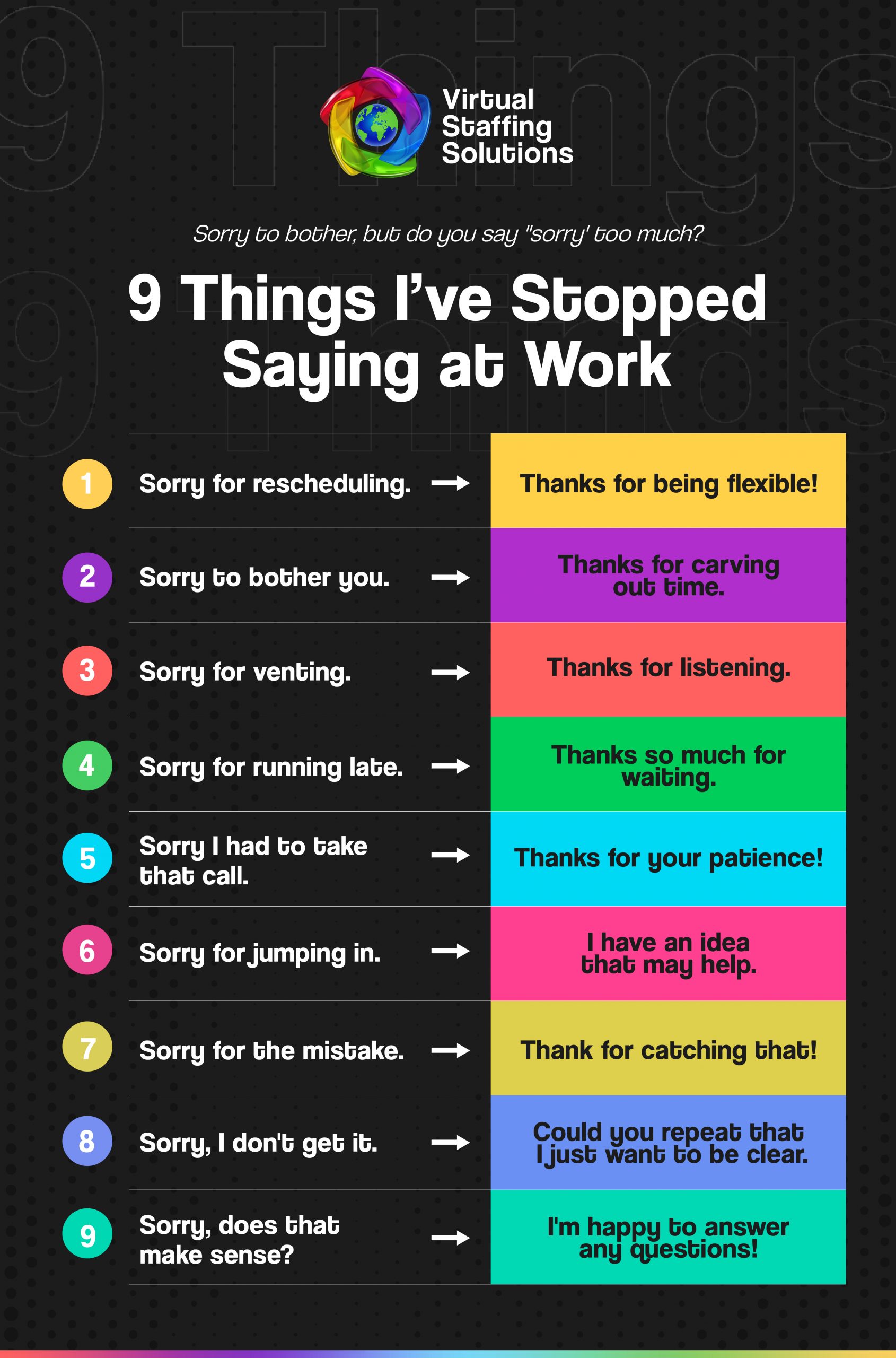🔍 Stop Saying “Sorry” at Work: Shift to Empowering Language 🌟
Sent by the Learning & Development Team
Hello Team Leaders,
Many of us tend to overuse the word “sorry” at work, often apologizing for things that don’t require an apology. This habit can inadvertently undermine your confidence and authority. Instead, try reframing these “sorry” statements into empowering language that acknowledges the situation while conveying professionalism and gratitude. Let’s explore how to shift from apologizing to appreciation or collaboration with these common phrases.
9 Things You Can Stop Apologizing for at Work
1. “Sorry for Rescheduling.”
- Why it matters: Instead of apologizing, express appreciation for flexibility. It shifts the focus to the positive, highlighting cooperation.
- Try saying: “Thanks for being flexible!”
- Reason: This acknowledges the person’s ability to adapt and makes them feel appreciated for accommodating changes.
2. “Sorry to Bother You.”
- Why it matters: Apologizing for reaching out can make you seem hesitant. Instead, thank them for their time.
- Try saying: “Thanks for carving out time.”
- Reason: This highlights their helpfulness, showing that you value their input and respect their time.
3. “Sorry for Venting.”
- Why it matters: It’s okay to express your feelings, but thanking someone for their support is more constructive.
- Try saying: “Thanks for listening.”
- Reason: This phrase shows gratitude for their emotional support without diminishing the importance of sharing your concerns.
4. “Sorry for Running Late.”
- Why it matters: Apologizing for lateness is polite, but gratitude for patience is more effective and positive.
- Try saying: “Thanks so much for waiting.”
- Reason: This reframes the situation by focusing on the person’s understanding and patience rather than your tardiness.
5. “Sorry I Had to Take That Call.”
- Why it matters: You don’t need to apologize for attending to important matters. Acknowledge their patience instead.
- Try saying: “Thanks for your patience!”
- Reason: This shifts the tone from regret to appreciation, making the interaction more positive.
6. “Sorry for Jumping In.”
- Why it matters: Instead of apologizing for contributing, frame your input as helpful.
- Try saying: “I have an idea that may help.”
- Reason: This approach highlights your willingness to contribute to the conversation rather than interrupting it.
7. “Sorry for the Mistake.”
- Why it matters: Mistakes happen, and acknowledging the person who caught it shows teamwork and accountability.
- Try saying: “Thank you for catching that!”
- Reason: This phrase focuses on collaboration and improvement, making it clear you value their attention to detail.
8. “Sorry, I Don’t Get It.”
- Why it matters: Asking for clarification shouldn’t be framed as a failure to understand. Asking for a repeat emphasizes your desire for clarity.
- Try saying: “Could you repeat that? I want to be clear.”
- Reason: This shows that you’re engaged and focused on understanding the information correctly without downplaying your ability to comprehend it.
9. “Sorry, Does That Make Sense?”
- Why it matters: Seeking validation for your message shouldn’t seem uncertain. Instead, offer to clarify if needed.
- Try saying: “I’m happy to answer any questions!”
- Reason: This shows confidence in your communication while inviting further discussion if necessary.
Weekly Leadership Challenge
🌟 Shift Your Language at Work:
- Pick One or Two Phrases to Practice: This week, choose a couple of these empowering alternatives to replace common “sorry” statements in your communication.
- Implement Daily: Make a conscious effort to rephrase your statements throughout the day.
- Reflect on Feedback: After a week, reflect on how these changes impacted your interactions and gather feedback on your communication style from colleagues.
By changing “sorry” into more constructive phrases, you can shift the tone of your conversations to be more positive, confident, and appreciative. These simple adjustments can greatly enhance how you present yourself at work and how others perceive you. Let’s move from apologizing to empowerment and create a more confident workspace together! 🌟💬
